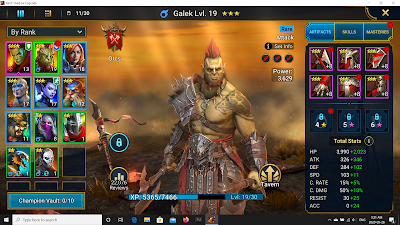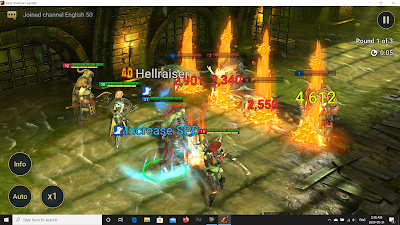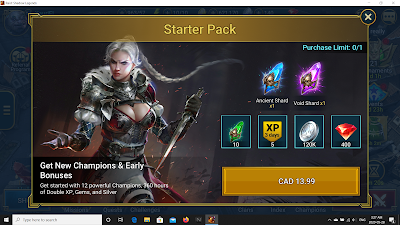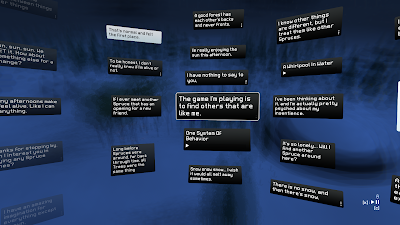So I finally got sucked in. After being bombarded with ads and offers on the various gaming-related YouTube channels I follow, I caved and decided to support one of my favourites by accepting their blandishment of free stuff, and downloaded
Raid: Shadow Legends. After all, so many people whose opinions on gaming I trusted were saying that this game was a lot of fun, and could they all really be lying through their teeth for profit? So I downloaded the game, made an account, gritted my teeth, and gave it a try.
And honestly, it's not the worst game I've ever played. The core gameplay loop is pretty bog-standard JRPG-style tactical turn-based combat, shorn of all of the extraneous exploration, puzzles, and all but the barest hint of plot and character development. The centrepiece is the collection and management of the game's endless stable of unique champions -- from Orcs, Elves, ad Dwarves to holy paladins, undead revenants to knights and barbarians to ferocious Lizardmen, each with a unique set of skills and their own strengths and weaknesses. It's a pleasant enough way to kill time.
But oh my god, is this game lousy with monetization. It uses pretty much every psychological trick in the book, and as such, it makes for an awesome case study in the way that modern games' financial models function. I don't know if Raid is particularly worse than any other free-to-play game on the market, but it is definitely the worst that I have ever had the pleasure of playing; and yet, it's still fairly enjoyable. But that enjoyment comes at a psychological cost.
 |
| My stable of champions. Not pictured: the parade of common cannon fodder who have fueled their advancement. |
To start with, there are the endless array of limiting factors. As Jim Sterling likes to put it, there's the "bullshit currency", silver, which is fairly freely available and which is required to perform almost any action in the game from summoning champions to upgrading weapons to improving skills, and the "real currecny", gems, which are drip-fed to the player but also available for real-word money and can in turn be traded for anything the player needs. Then, almost everything either needs or benefits from an additional extra item to perform -- shards of various capability to summon champions, the vast majority of which will be the near-useless commons (literally a party of level-1 common champions can't even beat the first level of the campaign) and whose main utility is as fodder to improve your more important heroes; skill books to improve skills, potions to "ascend" them, chickens to improve their rank from rare to legendary. All of which can be obtained through gameplay, but all of which are also available for a price in precious gems. There's also an energy meter which depletes as you engage in actual gameplay, and further tokens needed to fight other players' teams in the arena. I have seen this described by other games as an "anti-poopsocking" measure designed to stop the player from going for days without stopping play, but conveniently, all such games seem to provide methods of refilling or extending your energy ... for a price. You get tons and tons of such resources as a new player, especially if you've redeemed one of the endless head-starts offered by various YouTube channels, but eventually the silver and the excess energy has to run out, and you're stuck with whatever dribble the game will still allot to you, unless you choose to pay.
 |
| Actual gameplay: my primary party in the process of destroying the hopelessly outmatched opposition. |
Then, the relentless driving of engagement. The game has a free hand with the play rewards. There are of course increasing bonuses for logging in every day, rewards just for spending time playing the game, and a roster of daily, weekly, and monthly quests, plus a wealth of missions, challenges, and tournaments that ensure the player never lacks for something to do to earn a little reward. These intermittent hits of dopamine from progress and free stuff are addictive, and missing out on something you could have had with just a little more play feels pretty crappy. A really dedicated investigator would have tried to complete all of the time-dependent quests to see if you can actually do them all without paying, as a lot of them require limited-supply items to finish, but frankly, I just don't enjoy the game enough to spend that much time on it. This is all of course framed as a "reward", but we must keep in mind that what the player is being given is a solution to a problem the game itself creates, a problem of limited resources which is primarily present not to make gameplay more challenging or satisfying, but to present a barrier that can be surmounted, if the player chooses, by spending real money. And the more time the player spends on the game, the more investment they have in their champions and tournament ranks, the more tempting spending that money becomes. Then there is the classic trick, when upgrading weapons, of making the occasional upgrade fail -- a psychological tactic called "intermittent rewards" employed to great success in gambling institutions, requiring further investment of resources while exploiting the sunk-cost fallacy and the weaknesses of the dopaminergic system to encourage the player to give it just one more try.
 |
| Just look at all of the busywork I am expected to complete every day for a few gems. |
The final piece is of course the advertising. Raid is blatant in its promotion of its paid services. There are a continual stream of bundles and deals being offered by pop-up ads, all time-limited to play on FOMO and purchase-quantity-limited to create an artificial illusion of scarcity. There's a free shard item available in the store every day; that gets the player regularly visiting the storefront, with its array of tempting deals on offer, and I have definitely caught myself thinking "Hey, this bundle is only a buck thirty-nine! That's a steal!" In addition to the ability to directly purchase the items you need to advance and keep playing, there are a number of places where premium-currency gems can be "invested" to create a continuing gameplay benefit, giving the player a sense that they are building something of real worth, especially if what they have invested is not mere time and effort, but cold, hard cash. The game even gives me notifications in my fucking windows system tray! And there is the advertising blitz that got me into the game in the first place, that offer of a fortune in silver and a premium champion from those we trust to give us gaming content; all of those professional game content creators lying, if my experience with the game is any guide, through their teeth to sell this Skinner box psychological torture, each endorsement reinforcing the others until social proof gets the better of you, as it did me.
 |
| You get hit with about a half-dozen of these every time you go back to home base. |
Practically everything about the game is a calculated inducement to spend money. Which raises an interesting question: How much actual game can be removed from a game of this type before it ceases to be an actual game? Now I'm not saying that Raid involves no actual gameplay at all; there are plenty of others that would suffer in comparison. At its best, the combat can be a real challenge, as is the meta-game of picking the champions whose capabilities suit your play-style, figuring out which ones make a holistically effective party, and managing the byzantine system of character levels, weapon levels, character ranks, skill levels and ascensions, perks, whole-game advantages, and so on. But I find that in a lot of cases, my party is either vastly overpowered or vastly underpowered, with muscling through the actual battles either trivial or impossible. It is pretty rare to actually be in a situation where your characters are exactly the right power lever to make the encounters a tough but winnable challenge. The game even provides a convenient auto-battle option to save you from the tedious drudgery of actually choosing your moves when victory is a foregone conclusion. And actual battle, engaging in the core gameplay loop, is not what most of your playtime will consist of. Most of playing the game as a non-"whale" actually involves playing the monetization system, choosing which activities to engage in to generate maximum free value for time invested while battling the constant psychological pressure to just pay. Raid involves perhaps the minimum possible level of challenge required to be considered an actual game, and not just an unnecessarily complicated way of spending money for pretty virtual goods.
The sad part? I'm probably going to keep playing, even now that I've completed my study and analysis of the game. It's got its hooks in me. Missing out on my next daily reward, losing my progress toward that sweet legendary champion, and leaving all the quests I have started unfinished would be psychologically painful. The game may not have actually gotten any money out of me, but it's winning the battle.





